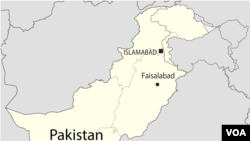Police in eastern Pakistan have registered blasphemy accusations against two female Christian nurses and launched an investigation into a crime that carries the death penalty in the majority-Muslim nation.
The accusation against members of the minority community is the latest in a series of controversial blasphemy cases in Pakistan, where critics say such charges often are motivated by personal vendettas, or religious hatred.
Police said that Muslim coworkers at a government hospital in the city of Faisalabad accused the nurses Friday of insulting Islam by removing and desecrating a wall-hanging that contained verses from the Quran.
The allegations quickly spread around the building and provoked scores of staffers to stage a demonstration to demand legal action against their Christian colleagues. An enraged Muslim mob, largely activists of an Islamist party from a nearby locality, later also joined the crowd.
Witnesses said an angry protester assaulted one of the nurses, Mariyum Lal, with a knife and injured her before riot police arrived at the facility to take both the women into “protective custody” and get them out of the hospital building.
Lal reportedly told police she had been asked to clean up the cupboard of the hospital’s female head nurse, who is Muslim. Lal said that while doing the job, she removed the adhesive wall-hanging and gave it to the head nurse before finishing the night shift along with the other accused Christian colleague and returning home.
Lal said the next morning the head nurse in the presence of other Muslim staffers accused her of desecrating the holy inscription.
Human rights groups say blasphemy cases lately have increased in Pakistan, where blasphemy is a highly sensitive issue. Those who are accused are sometimes lynched by mobs even before they reach court.
The United States Commission on International Religious Freedom (USCIRF) last year designated Pakistan as a Country of Particular Concern because of its "systematic enforcement" of blasphemy and other controversial laws against religious minorities.




